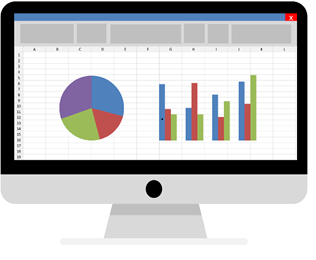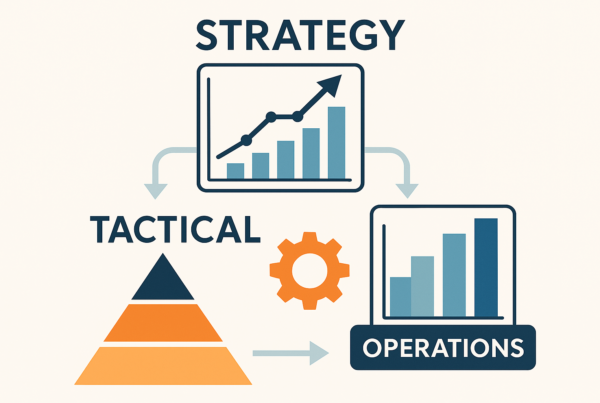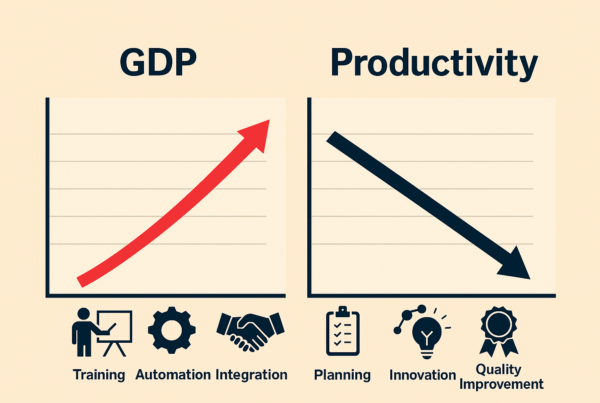Business owners have the important and difficult task of keeping the doors of their organisations open. This essentially means that they and their employees must make decisions on a regular basis in the best interests of the organisation. In order to do this, their organisations (people, processes and systems) must have the ability to transform and present data in a manner that facilitates decision-making.
In my personal experience, I come across many businesses that make decisions based on gut-feel and emotion. The question you should be asking yourself is: “How do I make more data-driven informed decisions?” A Business Intelligence (BI) approach will allow you to make data-driven decisions independent of emotion. Note however that we are human and some emotion will creep in which can be negated by using BI. On 1 December 2020, I had the pleasure of chatting about BI on Al Ansaar radio. You can listen to that interview here:
The level/complexity of the BI approach you use should (and can) be scaled to suite your needs. BI is not about using fancy technology that will cost you an arm and a leg – it can be a practical approach tailored to your business to serve you well. You can then scale-up as your business grows and you have more cash to invest. In this article, we are going to explain BI and its importance in today’s economic landscape.
What is Business Intelligence?
Business intelligence (BI) is the use of data to drive decision-making. Data-driven decision-making is beneficial to remove emotions and add an analytical approach to solving problems. It quantifies data into information which can be analysed to reduce waste, increase sales and improve customer experiences.
BI combines the practices of business analytics, data-mining, data visualization, tools and infrastructure to help organization make more informed decisions. In this way, the appropriate technologies are being used to convert data into information which then becomes useful to solve business problems.

In essence, BI is about taking a holistic approach to managing your business and driving optimization and improvements with the help of data. BI is being used in big banks, mining, transportation, social media companies – all with the purpose of making data-driven decisions.
Why take a Business Intelligence approach?
BI incorporates a scientific and quantifiable approach to how you run your business. From my experience, and this may sound contentious, many businesses started 30 years ago with a small operation and a few people. Maybe the business was run by two people and sold ten items. Today the business has multiple stores and sells many more products. However, the business still uses the same black book from 30 years ago. Maybe it still works, but it is very inefficient in the modern day. You need to ask yourself if the PEOPLE, PROCESSES and SYSTEMS have kept pace with the growth of the business – if it has not, you ARE leaving money on the table. Given the tough economic environment, you have to ensure the money you spend gives you the expected ROI (Return on Investment) – A BI approach helps you do this. Caution – do not allow yourself to think that this is not for you and hence do nothing. You will be doing yourself, your business and all those that rely on you a disservice.
An example: How to use Business Intelligence approaches to increase sales
There are many ways increase sales with BI. To increase sales, you have to understand your customers’ buying patterns. You need to understand what products attract them and what price are they willing to pay. BI can help uncover information hidden below the surface:
- What day of the week is the product being bought and why?
- Do customers buy products before or after pay day?
- How do customers react when there are specials?
- Where do your customers come from?
This data can be formatted and shaped to produce information that can influence your answers to the question of increasing sales. For example, this information can be used to promote your product range on the correct media platforms – you would not put a billboard advertisement on a road that your customers does not travel on. In this way, the data has helped you make the right decision which will give you the best potential return on investment.
How relevant is Business Intelligence in our current times (with Covid-19)?
BI is incredibly important to reduce waste in a business. I have written many blog posts on this website about the effects of Covid-19, lean thinking and tightening the belt. The data tells us that there is a reduction in sales and customer spending. Now, some of these factors are out of our control. What is within our control is our business expenses – having a BI approach to reducing expenses can help to identify and eradicate waste.
Some businesses may try a BI approach and fail. Some of the reasons for this failure could be:
- A lack of capacity within the organisation to properly apply BI tools to problems. This is a common problem when organisations and its people are in an operational mode. This is typically characterised by individuals being extremely busy moving from one fire to the next.
- A lack of capability. As mentioned above, there is a common trend of people capability and skills not keeping up with business growth and latest developments. Employees then do what they are comfortable with even though the approach may be antiquated.
- The lack of a clear vision, objectives and implementation plan. Not having a structured approach is like doing target practice in the dark and hoping you hit the target.
The above are some of the high level reasons for failure and can be costly.
Some advice on how to overcome failure are:
- Set a clear strategy, vision and objectives in respect of where you envisage your business evolving to.
- Develop a plan (Who is going to do what, and by when). This will help you determine if you have the capacity and capability within your organisation.
- Engage with the correct professionals/business advisors. They can help develop and execute the plan.
- Take the emotion out of decision making. Face your current realities.
- Understand the ROI for each decision.
What practical tips can business owners do or look at now?
I will give a few pointers here, and you are most welcome to contact me should you require more details and further information:
- Understand your business
- Understand your value chain
- Do a loss and waste analysis
- Understand your customers and their changing needs
- Be clear on how to merge your products and customers – how are you going to get the product to the customer?
- Understand waste within your business and determine how to eradicate it
- Know the details and use appropriate technologies to understand your data
Closing thoughts
Whilst, BI is a huge topic, I hope that this article as given you enough insight that you have realised that it does not have to be an onerous topic. Getting people with the correct capability can result in an approach that uses data analytics in a manner that is suitable for you and your organisation.
“Numbers do not lie. Politics and poetry, promises, these are lies. Numbers are as close as we get to the handwriting of God”
Hermann Gottlieb, Pacific Rim (2013)
Author
Dr Kenneth Moodley is an experienced supply chain and business professional with over 25 years’ experience. He has a demonstrated history of working with both big corporates (example: Unilever & The South African Breweries) and SMME’s (Productivity SA) in various industry sectors as a senior Supply Chain Specialist, Leader and Business Coach. In addition to his supply chain experience, he is a skilled business turnaround strategist and is a registered senior business rescue practitioner.
Co-Author
Trishen Naidoo is the co-director of Fulcrum Venture Capital (FVC), a start-up company based in Durban that focuses on digital marketing and investing. FVC have enlisted the services of Nikshen Consulting to assist in growing their business with the correct coaching and guidance.





